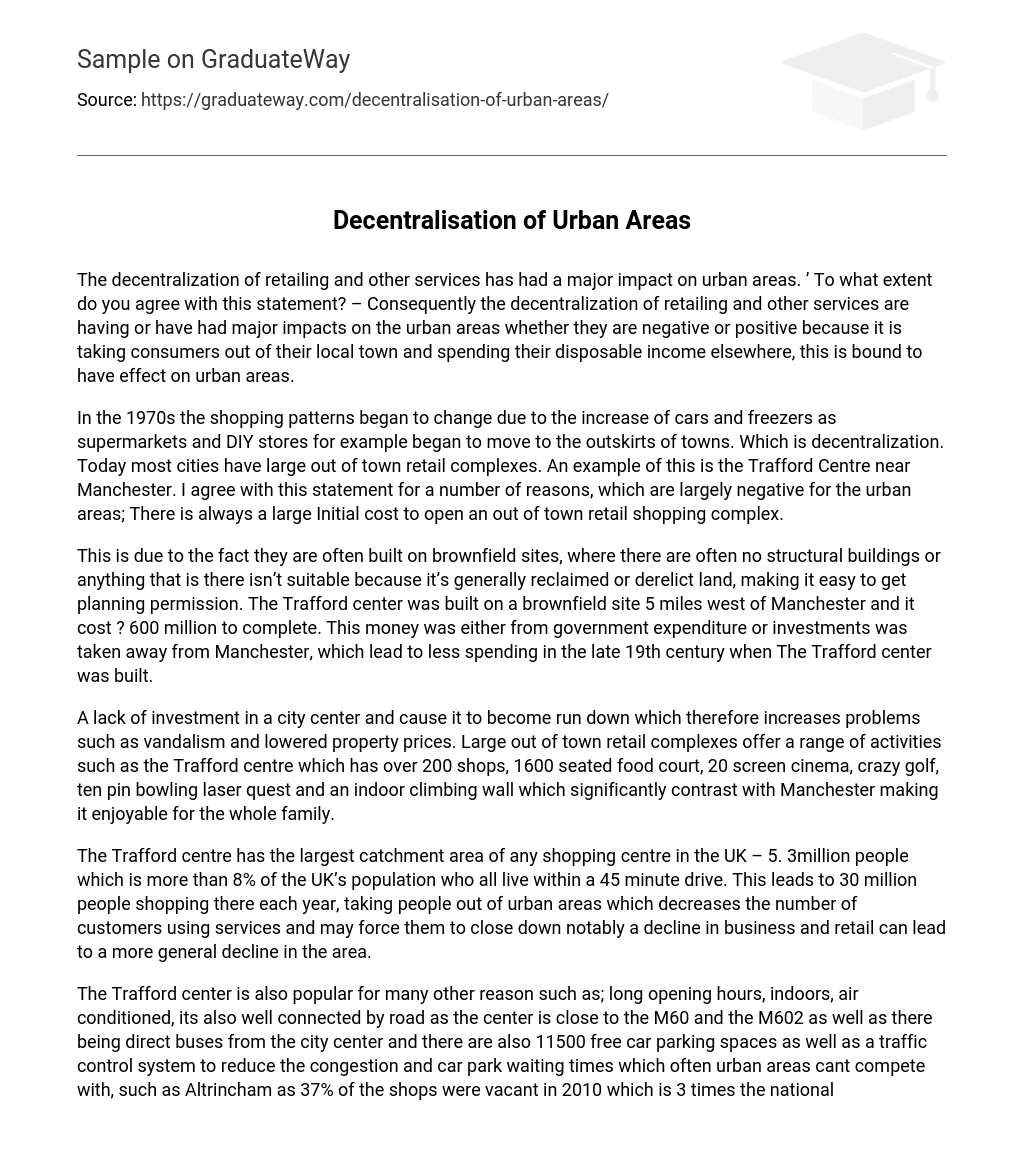The decentralization of retailing and other services has had a major impact on urban areas. ’ To what extent do you agree with this statement? – Consequently the decentralization of retailing and other services are having or have had major impacts on the urban areas whether they are negative or positive because it is taking consumers out of their local town and spending their disposable income elsewhere, this is bound to have effect on urban areas.
In the 1970s the shopping patterns began to change due to the increase of cars and freezers as supermarkets and DIY stores for example began to move to the outskirts of towns. Which is decentralization. Today most cities have large out of town retail complexes. An example of this is the Trafford Centre near Manchester. I agree with this statement for a number of reasons, which are largely negative for the urban areas; There is always a large Initial cost to open an out of town retail shopping complex.
This is due to the fact they are often built on brownfield sites, where there are often no structural buildings or anything that is there isn’t suitable because it’s generally reclaimed or derelict land, making it easy to get planning permission. The Trafford center was built on a brownfield site 5 miles west of Manchester and it cost ? 600 million to complete. This money was either from government expenditure or investments was taken away from Manchester, which lead to less spending in the late 19th century when The Trafford center was built.
A lack of investment in a city center and cause it to become run down which therefore increases problems such as vandalism and lowered property prices. Large out of town retail complexes offer a range of activities such as the Trafford centre which has over 200 shops, 1600 seated food court, 20 screen cinema, crazy golf, ten pin bowling laser quest and an indoor climbing wall which significantly contrast with Manchester making it enjoyable for the whole family.
The Trafford centre has the largest catchment area of any shopping centre in the UK – 5. 3million people which is more than 8% of the UK’s population who all live within a 45 minute drive. This leads to 30 million people shopping there each year, taking people out of urban areas which decreases the number of customers using services and may force them to close down notably a decline in business and retail can lead to a more general decline in the area.
The Trafford center is also popular for many other reason such as; long opening hours, indoors, air conditioned, its also well connected by road as the center is close to the M60 and the M602 as well as there being direct buses from the city center and there are also 11500 free car parking spaces as well as a traffic control system to reduce the congestion and car park waiting times which often urban areas cant compete with, such as Altrincham as 37% of the shops were vacant in 2010 which is 3 times the national average which is 13%. Major out of town retail shopping complex can also benefit the surrounding urban areas as;
Local councils and government can invest money to the city centre to attract customers back, these improvements often include creating pedestrian zones, renovating older shopping malls and organizing events. This was the case for Hulme in Manchester in the early 20th century as a City challenge partnership was formed and they worked with private companies to design a ? 37. 5 million regeneration package to redevelop the area. To create a strong community feel by building a mixture of housing, businesses, and community spaces and improving transport links.
The main shopping area was refurbished to include a range of shop, a covered market hall and a supermarket providing consumers with low order goods. Many out of town retail shopping complex are large yet want to give shoppers a community feel by supporting local community projects and charities through fundraising and donations , The Trafford center supports the Royal Manchester Children’s hospital. The center also provides work experience for local school students studying retail business – which develops the education around Manchester by giving inspiration and goals for local pupils.
Although not everyone allows these out of town retail shopping complex’s to take much effect on urban areas as; Large out of town retail shopping complex may not interest everyone as they may be pleased with the facilities they have their local urban areas and believe that they already have enough choice. they might not be accessible for everyone as decentralization favors the car owning middle and higher income groups – although this will be changing as the Trafford center is investing in improving public transport, cycle and pedestrian routes to help reduce traiffic but also making it more accessible for everyone.
In 2013 there will be a 40 bus services an hour to and from the Trafford centre and a shuttle bus to the metrolink tram line. Overall the evidence suggests that decentralization has had major impact on urban areas from a lack on investment to competition with the shops in the urban areas. The Trafford center proves they are taking consumers away from local areas this is why they are helping the Altrincham forward scheme by outlining strategies to draw people into the towns by establishing annual calendar events and reducing parking charges.





